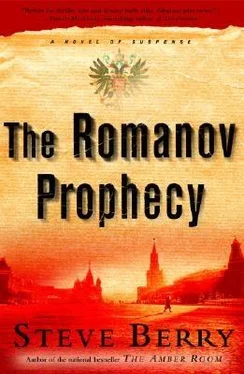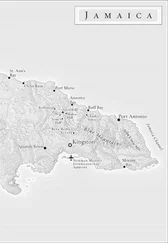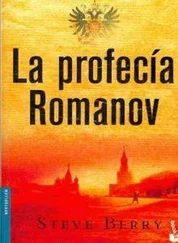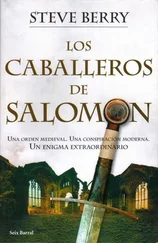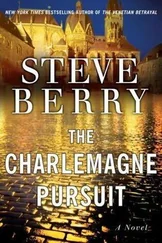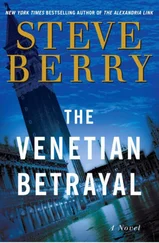Steve Berry - The Romanov Prophecy
Здесь есть возможность читать онлайн «Steve Berry - The Romanov Prophecy» весь текст электронной книги совершенно бесплатно (целиком полную версию без сокращений). В некоторых случаях можно слушать аудио, скачать через торрент в формате fb2 и присутствует краткое содержание. Жанр: Триллер, на английском языке. Описание произведения, (предисловие) а так же отзывы посетителей доступны на портале библиотеки ЛибКат.
- Название:The Romanov Prophecy
- Автор:
- Жанр:
- Год:неизвестен
- ISBN:нет данных
- Рейтинг книги:4 / 5. Голосов: 1
-
Избранное:Добавить в избранное
- Отзывы:
-
Ваша оценка:
- 80
- 1
- 2
- 3
- 4
- 5
The Romanov Prophecy: краткое содержание, описание и аннотация
Предлагаем к чтению аннотацию, описание, краткое содержание или предисловие (зависит от того, что написал сам автор книги «The Romanov Prophecy»). Если вы не нашли необходимую информацию о книге — напишите в комментариях, мы постараемся отыскать её.
The Romanov Prophecy — читать онлайн бесплатно полную книгу (весь текст) целиком
Ниже представлен текст книги, разбитый по страницам. Система сохранения места последней прочитанной страницы, позволяет с удобством читать онлайн бесплатно книгу «The Romanov Prophecy», без необходимости каждый раз заново искать на чём Вы остановились. Поставьте закладку, и сможете в любой момент перейти на страницу, на которой закончили чтение.
Интервал:
Закладка:
Their route took them through several dismal unhealthy meccas for metal smelting and tractor production. The air was a bitter smog of carbon and acid, everything filthy with soot. The whole area had once been a battleground. Pagans resisting Christians, princes vying for power, Tatars seeking conquest. A place where, as one writer had said, Russian earth drank Russian blood.
Starodug was a slender strip of a town oozing an imperial feel from colonnaded shops and wood and brick buildings. White-barked birch trees lined the streets, its center dominated by a three-spired church topped with midnight-blue onion domes and gold stars that glistened in the last rays of a setting sun. A sickening feeling of decay permeated the place-clear from structures teetering in disrepair, pavement crumbling, and green space in need of attention.
"Any suggestions on finding Kolya Maks?" he asked Akilina as they idled down one of the streets.
She motioned ahead. "I don't think that will be a problem."
He stared out the dirty windshield and saw a sign for the Kafe Snezhinki-cakes, meat pies, and ice cream noted as specialties on the storefront sign. The establishment consumed the ground floor of a three-story brick building with gaily carved window frames. Also on the sign he saw-IOSIF MAKS, OWNER.
"That's unusual," he said.
Russians didn't generally advertise ownership. He glanced around and noticed few other store signs, none with names. He recalled Nevsky Prospekt in St. Petersburg and the Arabat section of Moscow. Both trendy spots where hundreds of high-priced boutiques lined the street for miles in a commercial can-can. Only a few of those shops displayed prices, much less ownership.
"An omen of the times, perhaps," Akilina said. "Capitalism creeping upon us. Even here, in rural Russia." A smile noted that she was kidding.
He parked the Lada and they climbed out into fading darkness. He led the way back to the Kafe Snezhinki. The sidewalk was empty except for a dog chasing a fleeing magpie. Few retail shops were lit. Outside of metropolitan regions Russian stores were only rarely open on the weekend. More remnants, he knew, of a Bolshevik past.
The cafe was sparsely decorated. Four rows of tables dotted the center. Glass cases held the day's food assortment. An aroma of bitter coffee filled the air. Three people sat at one table, a solo at another. No one seemed to pay them any attention, though he wondered how many black men appeared here on a given day.
The man behind the glass cases was short and stout with bushy copper hair and a shaggy mustache and beard to match. He wore an apron smeared with an assortment of stains and, as he approached, a smell of feta cheese came with him. He was wringing his hands dry with a dirty towel.
"You Iosif Maks?" Lord asked in Russian.
A strange look came back.
"Where are you from?" the man said in Russian.
He decided the less information the better. "Why does that matter?"
"Because you're in my store asking questions. Talking like a Russian."
"Then I assume you're Iosif Maks?"
"State your business."
The tone was gruff and unfriendly, and he wondered if the reason was prejudice or ignorance. "Look, Mr. Maks, we're not here to cause trouble. We're looking for a man named Kolya Maks. He's probably long dead, but would you know if any of his relatives still live here?"
The man's gaze was tight. "Who are you?"
"My name is Miles Lord. This is Akilina Petrovna. We've come from Moscow looking for Kolya Maks."
The big man tossed the towel aside and clasped his arms around his chest. "There are a lot of Makses living around here. I know of no Kolya."
"He would have lived here in Stalin's day, but his children or grandchildren might still be around."
"I am a Maks by my mother and have never been close with any of them."
"Then why is your last name Maks?" he quickly asked.
A flustered look crept onto the Russian's face. "I have no time for this. I have customers."
Akilina moved close to the glass counter. "Mr. Maks, this is important. We are in need of Kolya Maks's relatives. Could you not tell us if they live here?"
"What makes you think they live here?"
Lord heard footsteps behind him and turned as a tall policeman entered the cafe, dressed in the rural uniform of the militsya, his head covered with a blue fur shlapa. He unbuttoned and removed his greatcoat, then sat at one of the tables, waving at Iosif Maks. The proprietor understood and busily went about preparing a coffee. Lord moved close to the counter. The policeman made him nervous. He kept his voice low as he spoke to Maks's back.
"He that endureth to the end shall be saved."
Maks's head swiveled around. "What does that mean?"
"You tell me."
The Russian shook his head. "Crazy American. Are you all nuts?"
"Who said I'm American?"
Maks looked at Akilina. "Why are you with this chornye?"
He did not react to the derogatory remark. They needed to leave the cafe with minimal disruption. Yet there was something in Maks's eyes that contradicted his words. He wasn't sure, but the man might be sending him a message that now was not the time or the place. He decided to take a chance. "We're leaving, Mr. Maks. Any suggestions where to stay for the night?"
The proprietor finished preparing the coffee and headed around the far end for the policeman's table. He deposited the drink, then returned.
"Try the Okatyabrsky Hotel. Turn left at the corner, then three blocks toward the center of town."
"Thanks," he said.
But Maks did not return the pleasantry and retreated back behind the glass cases without saying another word. Lord and Akilina started for the exit but were forced to walk right by the policeman, who sat sipping his steaming coffee. He noticed the man's gaze linger far longer than it should have. Turning back toward the glass counter at the other side of the room, Lord saw that Iosif Maks noticed, too.
They found the Okatyabrsky. The hotel filled a four-story building, the street-side rooms all with rickety balconies. The lobby's floor was dusted with black dirt, the air heavy with the sulfur scent of bad plumbing. The clerk behind the desk was cantankerous, promptly declaring that the hotel did not accept foreigners. Akilina took charge of the situation and angrily informed him that Lord was her husband and she expected him to be treated with respect. After some haggling, one room was let at a higher-than-usual rate, and they trudged upstairs to the third floor.
The rooms were spacious but timeworn, the decor something out of a 1940s movie. The one concession to modern times was a small refrigerator that churned intermittently in one corner. The attached bath wasn't much better-no toilet seat or paper, and when Lord went to rinse his face, he learned that the hot and cold water ran, but not at the same time.
"I imagine not many tourists come this far south," he said, stepping out of the bath toweling his face dry.
Akilina was sitting on the edge of the bed. "This area was forbidden during communist times. Only recently have foreigners been allowed."
"I appreciate what you did down there with the clerk."
"I am sorry also for what Maks said to you. He had no right."
"I'm not so sure he meant it." He then explained what he'd gleaned from the Russian's eyes. "I think he was as nervous about that policeman as we were."
"Why? He said he knew nothing of Kolya Maks."
"I think he lied."
She smiled. "You are an optimistic raven."
"I don't know about optimistic. I'm assuming there's at least a grain of truth to this whole thing."
"I hope there is."
He was curious.
"What you said last night is true. Russians want to remember only the good in the tsarist government. But you were right. It was an autocracy, repressive and cruel. Still… this time it could be different." A smile creased her lips. "What we are doing may be a way to cheat the Soviets one last time. They thought themselves so clever. But the Romanovs may have survived. Would that not be fitting?"
Читать дальшеИнтервал:
Закладка:
Похожие книги на «The Romanov Prophecy»
Представляем Вашему вниманию похожие книги на «The Romanov Prophecy» списком для выбора. Мы отобрали схожую по названию и смыслу литературу в надежде предоставить читателям больше вариантов отыскать новые, интересные, ещё непрочитанные произведения.
Обсуждение, отзывы о книге «The Romanov Prophecy» и просто собственные мнения читателей. Оставьте ваши комментарии, напишите, что Вы думаете о произведении, его смысле или главных героях. Укажите что конкретно понравилось, а что нет, и почему Вы так считаете.
